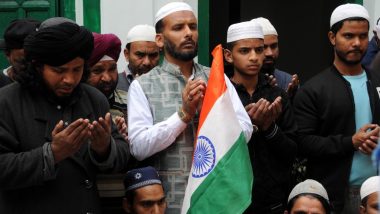New Delhi, April 6: Shab-e-Barat, the holy night of fortune and forgiveness, is observed by sections of Muslims on the night between 14 and 15 of Shabaan month. The meaning of Urdu word Shab is night, while Barat is an Arabic noun which is roughly translated to English as either innocence or salvation. Shab-e-Barat assumes significance as it is believed that on this night, which comes 15 days before the holy month of Ramadan or Ramzan, God decides the fortunes of men and women for the coming year. Shab-e-Barat, also known as Laylat-ul-Baraa or mid-Shabaan, is mainly observed by Sunni Muslims adhering to the Barelvi and the Deobandi school of thoughts. Shab-E-Barat 2020: Delhi Police Appeals to People to Stay Indoors Amid Coronavirus Lockdown.
Shab-e-Barat Date in India:
Shab-e-Barat is observed on 15th of the Islamic month of Shabaan. Here it may be noted that under the Islamic calendar, the date changes post the sunset and not after the clock goes past 12 midnight. Therefore, the 15th of Shabaan will begin after the sun sets on Thursday, April 9, 2020. The festival will be observed until the next sunset, i.e. the evening of Friday, April 10, 2020. Coronavirus Outbreak: NCP Chief Sharad Pawar Urges Muslims to Stay at Home on Shab-e-Barat 2020.
Shab-e-Barat significance:
Muslims believe Shab-e-Barat marks the night when God seals people's fate in terms of life and death until the next year. According to a Hadith in Baihaqi, Prophet Mohammed told his wife Hazrat Aisha: "...record is made of every human being who will be born, and of every human being who will pass away this year. In it, their deeds are taken up to heaven and in it, their provisions are sent down."
The festival is also known as the night of forgiveness. It is reported from Hazrat Ali that Prophet Mohammed said: "When the middle night of Shaban arrives, spend it in worship and fast during the day. On this night, at sunset, Allah descends to the nearest heaven and announces: ‘Is there no one asking forgiveness that I may forgive him? Is there no one asking provision that I may grant him provision? Is there no one afflicted that I may relieve them? Is there not such and such?’ (He keeps announcing) till the dawn comes."
Therefore, Muslims pray throughout the night to seek forgiveness for their sins. Since the festival is considered to be the 'Eid of those who have died', several Muslims visit their graveyards to seek forgiveness for their deceased relatives. Many also observed a fast the following day.
(The above story first appeared on LatestLY on Apr 06, 2020 11:36 PM IST. For more news and updates on politics, world, sports, entertainment and lifestyle, log on to our website latestly.com).













 Quickly
Quickly




















